|
|
|
Sort Order |
|
|
|
Items / Page
|
|
|
|
|
|
|
| Srl | Item |
| 1 |
ID:
145867
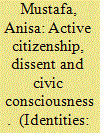

|
|
|
|
|
| Summary/Abstract |
British Muslims have confronted numerous challenges since 9/11 which have rendered their citizenship ‘precarious’ and ‘contingent’, including rampant Islamophobia and a disproportionate impact from tighter security and immigration measures. Additionally, they are also disadvantaged by new forms of governance which promote ‘active citizenship’ based on both neoliberal and resurgent nationalist demands for citizens to be more self-reliant as welfare provision shrinks. This article explores how young British Muslim civil society activists negotiate some of these challenges by analysing their discourses on citizenship and belonging. Based on an ethnographic study, it is suggested that despite experiencing exclusion and marginalisation, young Muslim activists incarnate active citizenship but with reference to a very different set of values and priorities in contrast to nationalist and neoliberal normative ideas. Demonstrating a strong commitment to civic responsibility and participation, these young Muslims defy fears that negative associations with Britishness weaken the value and relevance of citizenship.
|
|
|
|
|
|
|
|
|
|
|
|
|
|
|
|
| 2 |
ID:
022894
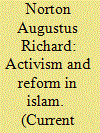

|
|
|
|
|
| Publication |
Nov 2002.
|
| Description |
377-381
|
|
|
|
|
|
|
|
|
|
|
|
|
|
|
|
| 3 |
ID:
157913
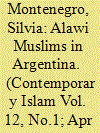

|
|
|
|
|
| Summary/Abstract |
This article examines contemporary aspects of the identity construction of the ‘Alawi diaspora in Argentina. In the local context, the preservation of ‘Alawi singularity has so far been a key element in the group’s identity. The strategies for integration as legitimate Muslims in the wider Islam and the closeness to Shi’ism are relatively independent of how these processes took place in the homeland. I first describe the geography of the diaspora in Argentina, comprising the spaces and institutions where descendants settled all over the country. I analyze the factors that helped keep the nodes connected and I will demonstrate that these constitute a center/periphery logic for communities concerning the alleged degrees of preservation of the culture of origin they symbolize. I will try to show that ‘Alawis integrated into the diversity of Islam in Argentina while preserving their sectarian borders and, at the same time, stressing an “Arab” identity. I argue that these strategies should be understood in the local arena of an intra-Islamic pluralism that constitutes Muslim presence in Argentina, where the dynamics of sectarianisms assume idiosyncratic characteristics. Finally, I will show institutional closeness to Shi’ism as a recent development, promoted by the common political stance of both groups on the conflict in Syria. We will see that this closeness does not imply the dissolution of doctrinal boundaries between Shi’is and ‘Alawis and that it involves a redefinition of the diaspora in terms of increasingly claiming a Syrian national origin.
|
|
|
|
|
|
|
|
|
|
|
|
|
|
|
|
| 4 |
ID:
089953
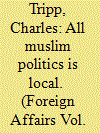

|
|
|
|
|
| Publication |
2009.
|
| Summary/Abstract |
Gilles Kepel and Ali A. Allawi explore the troubled relationship between power and Islam and conclude, each in his own way, that Muslims who seek to shape the world according to their religious values often confront an obdurate reality.
|
|
|
|
|
|
|
|
|
|
|
|
|
|
|
|
| 5 |
ID:
188959
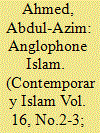

|
|
|
|
|
| Summary/Abstract |
The field of ‘Islamic Studies’, like ‘Religious Studies’, is a broad-church. It includes a number of epistemological and ontological positions associated with a range of disciplines. The diversity inherent in a category such as ‘Islamic Studies’ is challenged by a bifurcation of two predominant approaches found within the field, the textual and the sociological. In this paper, I seek to propose a new concept for contemporary Islamic studies, that of Anglophone Islam, which will allow a broader range of scholarship to be contextualised in relation to each other. The concept also opens a new set of questions to be explored by scholars of Islamic studies. It will be of particular interest to scholars involved in contemporary Islamic studies in fields such as American Muslim studies, British Muslim studies and European Muslim studies, but will also have utility to theological, historical and philosophical scholars of Islam working in the English language.
|
|
|
|
|
|
|
|
|
|
|
|
|
|
|
|
| 6 |
ID:
106659


|
|
|
|
|
| Publication |
2011.
|
| Summary/Abstract |
This study examines how Arab states have constructed national regulatory regimes for satellite television and telecommunications which undermine or inhibit the emergence of the three normative requisites for a civil political culture: freedom, equality and tolerance. Drawing on case studies of Jordan, Egypt and the UAE, the study argues that, by failing to be either self-limiting or to protect civil society from its uncivil components in the new communicative spaces provided by these technologies, the Arab states are attempting to reconstruct their own dominant (new) media spaces and so prevent the conditions which might foster democratic political cultures of civility.
|
|
|
|
|
|
|
|
|
|
|
|
|
|
|
|
| 7 |
ID:
111812
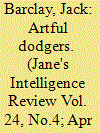

|
|
|
| 8 |
ID:
121886
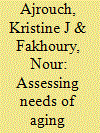

|
|
|
|
|
| Publication |
2013.
|
| Summary/Abstract |
The purpose of this study was to provide a critical perspective on the needs of aging Muslims by focusing on a diverse group of older adults including those with ancestry from African American, South Asian, Arab, and Albanian origins. Four focus group discussions were conducted with adults aged 60+ recruited from four Muslim centers in the metro-Detroit area. Grounded analysis uncovered themes related to needs, strengths and challenges in the Muslim community, as well as suggestions for the way forward in addressing aging issues. Needs identified include quality of life and social relations. Strengths included references to tradition and scripture. Challenges named referred to conflict both within and outside of the family. Finally, the way forward consisted of the desire for options to support aging families within the community, often in small steps, though not necessarily only through mosques. Findings also suggested that women may be a key agent of change within the Muslim community. In sum, this study uncovered areas of overlap and at times disagreement between and within groups, underlining the fact that there is no one kind of Muslim aging, and that any approach to caring for Muslims must combine cultural sensitivity with flexibility in order to minimize anxiety and stress for both elders and their families.
|
|
|
|
|
|
|
|
|
|
|
|
|
|
|
|
| 9 |
ID:
096621
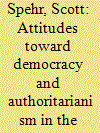

|
|
|
| 10 |
ID:
160443
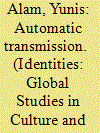

|
|
|
|
|
| Summary/Abstract |
This article is based on ethnographic research carried out in Bradford, an ethnically diverse city situated in the north of England. The sample of over 60 participants mostly comprises males of British Pakistani Muslim heritage but varies in terms other markers of identity such as social class, profession and residential/working locale. The article analyses the cultural value and meaning of cars within a multicultural context and how a consumer object can feed into the processes which refine and embed racialized identities. Small case studies reveal the concrete and discursive ways through which ideas around identity and ethnicity are transmitted and how, in particular, racialization continues to feature as a live, active and recognizable process in everyday experience.
|
|
|
|
|
|
|
|
|
|
|
|
|
|
|
|
| 11 |
ID:
120017
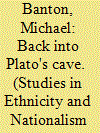

|
|
|
| 12 |
ID:
096520
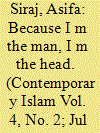

|
|
|
| 13 |
ID:
113396
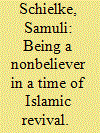

|
|
|
|
|
| Publication |
2012.
|
| Summary/Abstract |
Looking at the trajectories of people of Muslim origin in Egypt who express religious doubts, I argue in this article that doubt and nonreligiosity are not necessarily a child of a Christian genealogy of the secular and definitely not alien to Muslims. Instead, we have to understand them as an intimate moral discontent with the contemporary age of Islamic revival, even if their shape and some of their positive claims are borrowed from notions of Western origin and global currency-most notably, human rights and feminism. There are reasons and ways to become a nonbeliever in a society profoundly affected by a religious revival, and these reasons and ways can be telling about the nature of doubt and certainty in general. They also offer a perspective on the problematic of secularism that focuses on issues of belief and existential trust rather than governmentality and discursive power.
|
|
|
|
|
|
|
|
|
|
|
|
|
|
|
|
| 14 |
ID:
185581
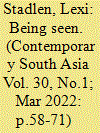

|
|
|
|
|
| Summary/Abstract |
Through an ethnographic focus on a Muslim village in rural West Bengal, this article explores how a group of women have come to defy gendered socio-cultural and locally rooted religious interpretations to become the bureaucratic and political gatekeepers within their community. The wider climate for Muslim men at this moment across India, the characteristics of bureaucratic spaces themselves and the perceived necessity of this kind of work for the most marginal are all identified as facilitating this shift. Yet in addition to these factors, this article will claim that the women themselves are wilfully utilising these encounters in order to become seen by the organs and actors of the local Indian state. It is not simple recognition they are after, nor to be considered as bureaucratic or political insiders, but rather to be seen on their own terms in diverse and context dependant ways that are ultimately of their choosing. As such, this shorkārī kāj or political work has become a central part of their daily lives and identities, to which it is suggested that their attributes and experiences as women may make them particularly well suited.
|
|
|
|
|
|
|
|
|
|
|
|
|
|
|
|
| 15 |
ID:
102935
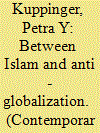

|
|
|
|
|
| Publication |
2011.
|
| Summary/Abstract |
This paper examines the Islamische Zeitung (IZ), a newspaper made by German Muslims for German Muslims that informs about political, cultural, and theological topics. I argue that beyond providing information, the paper aims to create a platform of debate for a growing group of, in particular, younger pious educated Muslims who examine current politics by way of an Islamic and also an anti-globalization perspective. Of relevance for this audience are Islamic knowledge, local and global politics, everyday religious concerns and practices, and cultural affairs. I illustrate how by discussing certain topics on its pages, the makers of the IZ support specific issues of debates among some pious individuals, such as for example the participation of pious Muslims (men and women) in the democratic process by way of running in elections. Finally I argue that the IZ seeks to link the German Muslim community to the context of the global ummah and here in particular the globalized ummah as a new community marked by a shared popular culture universe. I illustrate that contrary to the claims of some of its opponents, the IZ is a platform for German Muslim affairs that participates in the broader public sphere as much as it helps to mediate a variety of possibilities for the participation of individuals and communities.
|
|
|
|
|
|
|
|
|
|
|
|
|
|
|
|
| 16 |
ID:
058742
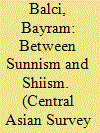

|
|
|
| 17 |
ID:
097200
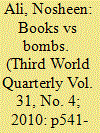

|
|
|
|
|
| Publication |
2010.
|
| Summary/Abstract |
Through the lens of the new institutional economics development is represented as a process of cultural and institutional transformation in which informal social institutions that hinder the operation of market forces are dismantled and replaced with formalised, liberal institutional frameworks to facilitate rational economic activity. The World Bank has deployed these arguments to legitimise reforms aimed at reshaping the values and conduct of postcolonial citizenries to facilitate entrepreneurship and competitiveness. To deconstruct this discourse, the article points to its underlying contradictions; specifically, to the way that the idealised formal rationality of impersonal markets is necessarily subsumed in practice within the substantive irrationalities of capitalist development. Consequently the informal social relations that the Bank deems instances of cultural atavism and a barrier to competitiveness arise as intrinsic features of global capitalism. Seemingly impervious to reform, informalised populations appear as objects to be restrained or removed by the state. Coercion, I argue, emerges as the inevitable concomitant of competitiveness.
|
|
|
|
|
|
|
|
|
|
|
|
|
|
|
|
| 18 |
ID:
137182
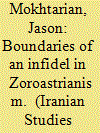

|
|
|
|
|
| Summary/Abstract |
This paper explores the Middle Persian term agdēn, which is often problematically translated as “infidel.” By tracing this term of otherness through Middle Persian texts such as legal cases in The Book of a Thousand Judgments and polemics in the Dēnkard Book III, this article argues that the concept of the infidel frequently appears in discussions about slavery, intermarriage, and conversion to and from Zoroastrianism. Middle Persian legal and theological texts regarding infidels deal with cases in which Zoroastrian interactions with non-Zoroastrians impinge upon Zoroastrian boundaries of identity. Moreover, the term agdēn often refers to Jews, Christians, and Muslims, thereby offering insight into the ties between Zoroastrian self-identity and other groups which the Persian priests encountered. In the end, this paper demonstrates the need for further intensive studies into Middle Persian technical terms of otherness as they lie at the heart of questions of Zoroastrian self-definition and attitudes towards others.
|
|
|
|
|
|
|
|
|
|
|
|
|
|
|
|
| 19 |
ID:
082162
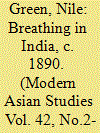

|
|
|
|
|
| Publication |
2008.
|
| Summary/Abstract |
This essay examines a series of 'Hindustani' meditation manuals from the high colonial period against a sample of etiquette and medicinal works from the same era. In doing so, the essay has two principal aims, one specific to the Indian past and one pertaining to more general historical enquiry. The first aim is to subvert a longstanding trend in the 'history' of religions which has understood meditational practices through a paradigm of the mystical and transcendent. In its place, the essay examines such practices-and in particular their written, and printed, formulation-within the ideological and technological contexts in which they were written. In short, meditation is historicised, and its 'Hindu' and 'Muslim' expressions, compared in the process. The second aim is more ambitious: to test the limits of historical knowledge by asking whether it is possible to recount a history of breathing. In reassembling a political economy of respiration from a range of colonial writings, the essay thus hopes to form a listening device for the intimate rhythms of corporeal history. In doing so, it may suggest ways to recount a connected and necessarily political history of the body, the spirit and the world
|
|
|
|
|
|
|
|
|
|
|
|
|
|
|
|
| 20 |
ID:
092006
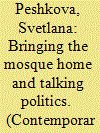

|
|
|
|
|
| Publication |
2009.
|
| Summary/Abstract |
In this article I argue that domestic space has to theorized as an important center of religious practice and socio-political activism. Born-again and devout Muslim women in the Ferghana Valley (Uzbekistan) use domestic space as an important sacred place for religious abservance and socialization equal to the mosques. This sacred place has a special meaning for born-again and devout Muslim as it carries a promise of personal and social change. In the context of religious and political persecution by the Uzbek state, domestic space is experienced as a politically safe place and as a critically important site of socio-political criticism and activism, as some intimate in-house discussions about religious, political, and social oppression take a form of public protest on the streets.
|
|
|
|
|
|
|
|
|
|
|
|
|
|
|
|
|
|
|
|
|